Key takeaways:
- Understanding tax obligations is crucial for organizations, especially in child safeguarding, to maximize resources and streamline compliance.
- Child safeguarding initiatives build community trust and have a long-term impact on future generations.
- Proactive tax management through preparation, leveraging technology, and seeking professional advice can ease challenges and enhance organizational effectiveness.
- Shifting perspectives on tax obligations can transform them from burdens into tools for community support and empowerment.
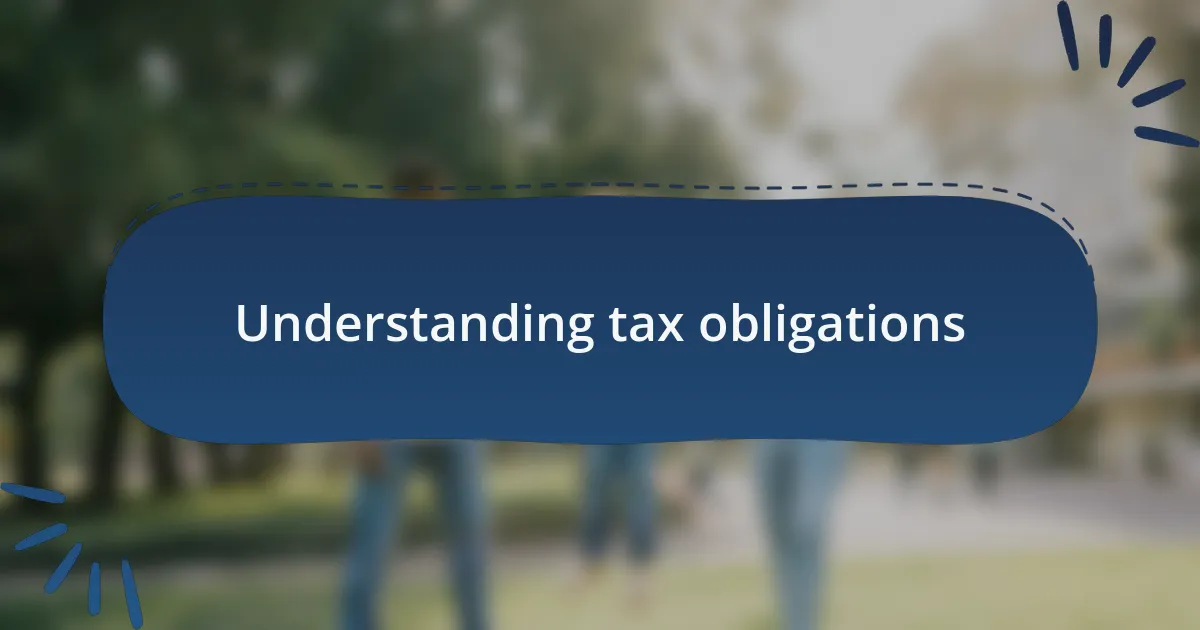
Understanding tax obligations
When I first dove into the world of tax obligations, I was struck by how complex it could be. Did you know that tax laws can vary significantly depending on the organization’s structure? For instance, as a non-profit in the child safeguarding sector, navigating through tax-exempt statuses and understanding what qualifies as permissible income became crucial for me.
I vividly recall the moment I discovered how vital keeping meticulous records would be. At first, I thought, why bother with the details? However, I quickly learned that having organized documents not only simplified compliance but also gave me peace of mind during audits. Have you ever felt overwhelmed trying to keep everything in order? Trust me, getting a handle on those records early on made all the difference.
Understanding tax obligations isn’t just about compliance; it’s also a way to further the mission of safeguarding children. How can we allocate resources effectively if we don’t grasp our financial responsibilities? I remember feeling empowered when I realized that by staying informed and proactive about taxes, I could maximize our funds to help more children. That realization shifted my perspective entirely and reinforced my commitment to the cause.
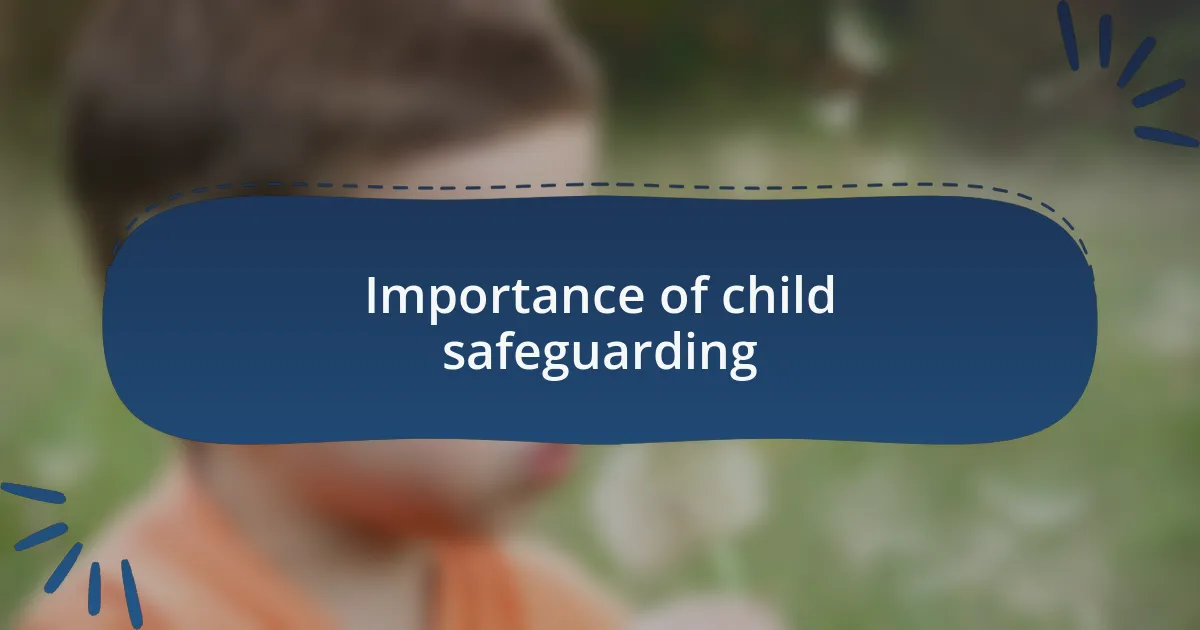
Importance of child safeguarding
Child safeguarding is essential because it ensures that the most vulnerable members of our society are protected from harm and exploitation. In my experience working within this field, I often reflect on the stories of children who have faced unimaginable challenges. Each case I encountered reinforced the urgency of creating safe environments where they can thrive and heal. How could we justify our roles if we didn’t prioritize their safety first?
Moreover, safeguarding initiatives can significantly enhance community trust and collaboration. I remember participating in a local workshop where we discussed strategies for effective child protection. The exchange of ideas among professionals and community members was inspiring; it was evident that when we unite our efforts with a clear focus on safeguarding, we build a stronger support network for children. Have you ever considered how collective action can multiply our impact?
Finally, the importance of child safeguarding extends beyond immediate protection; it shapes future generations. By investing in safeguarding practices today, I’ve seen firsthand how children develop into resilient individuals who can break the cycle of trauma. It’s a powerful reminder that every step we take towards safeguarding not only protects a child but also helps cultivate a healthier, more compassionate society. Isn’t that a goal worth pursuing together?
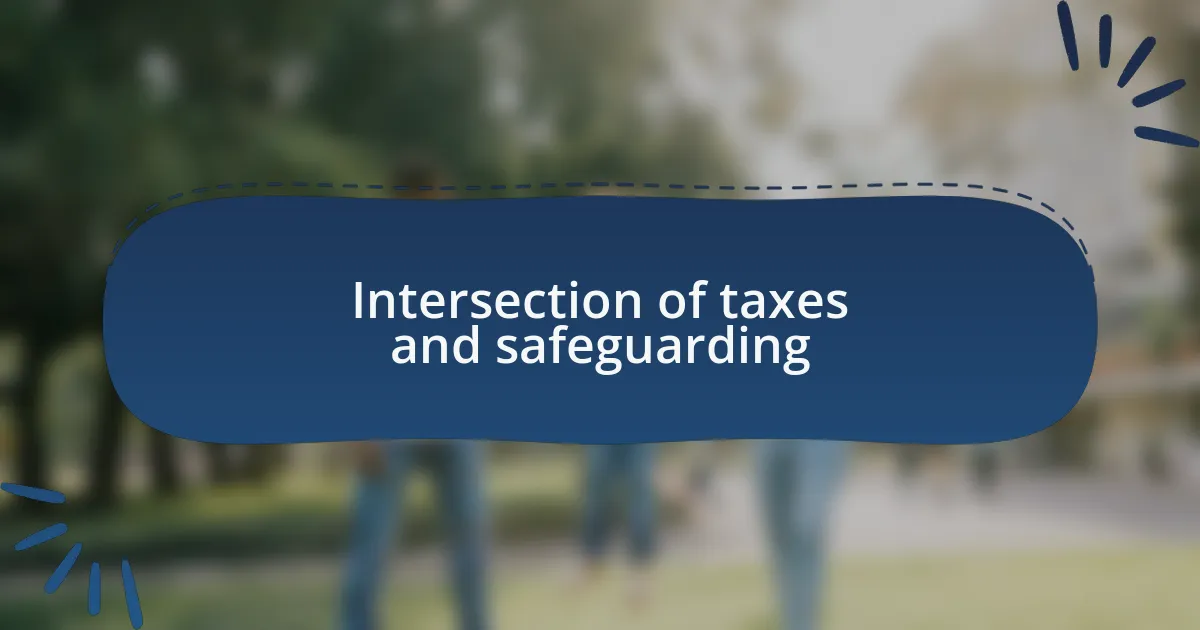
Intersection of taxes and safeguarding
Understanding the intersection of taxes and safeguarding can be eye-opening. For instance, I once worked on a project where we faced unexpected tax complications while applying for funding. It became clear that understanding tax obligations was crucial, not just for compliance but also for maximizing resources dedicated to child safeguarding initiatives. How can we effectively protect children if our funding is compromised due to simple tax oversights?
Moreover, I’ve discovered that charitable organizations focusing on safeguarding often have tax-exempt status, which allows them to redirect funds toward vital programs. I remember discussing this with a colleague who emphasized how tax benefits can empower organizations to do more, extending their reach to support families in crisis. Doesn’t it make sense to utilize every tool available to enhance our impact on child protection?
Navigating the tax landscape requires diligence but can ultimately reinforce our safeguarding efforts. I recall a time when a successful grant application hinged on our ability to present our financial plans transparently, including our tax responsibilities. Without that clarity, it would have been near impossible to secure the support we needed. Isn’t it pivotal that we equip ourselves not just with the mission to protect, but also with the knowledge to sustain those efforts through responsible financial management?
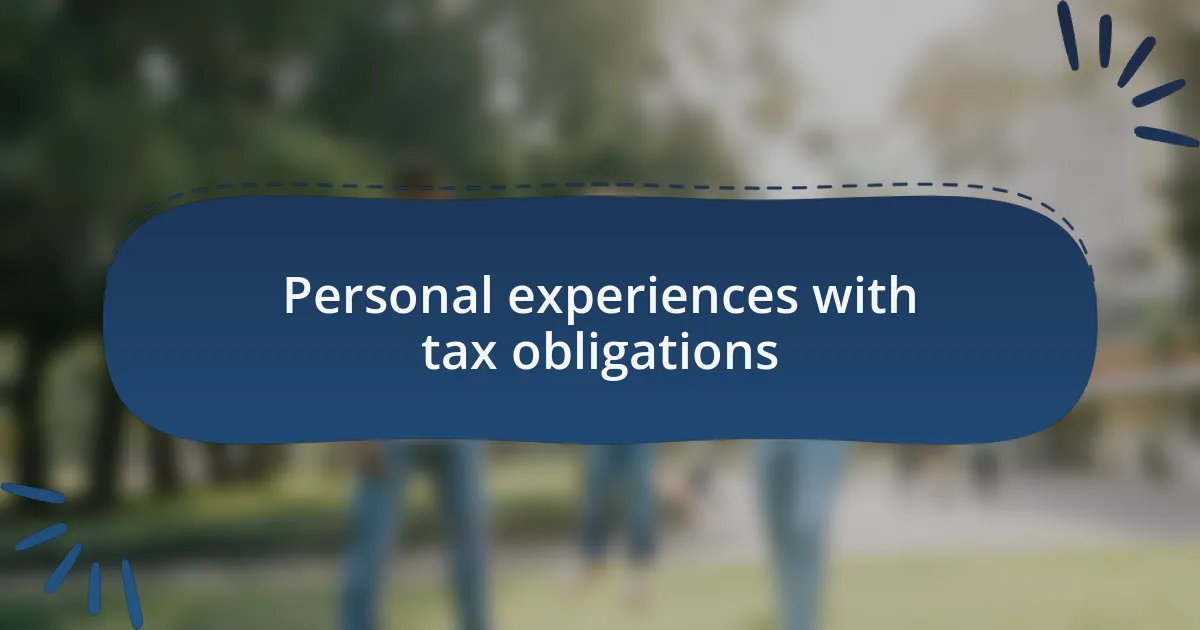
Personal experiences with tax obligations
Amid my work in child safeguarding, I found myself grappling with tax obligations that felt daunting at first. During one initiative, I was blindsided by a tax audit that revealed discrepancies in our financial reporting. It hit me hard—navigating the tax system isn’t just about compliance; it’s about safeguarding the very resources we need to protect children and support families.
On another occasion, I faced a situation where our organization needed to file for a specific tax exemption. The process was intricate, and I remember feeling overwhelmed. Yet, as I researched and sought guidance, I realized that these challenges could become stepping stones to greater efficiency. How reassuring it was to know that, ultimately, this effort would not just save money but enhance our ability to allocate funds where they were most needed.
In a more personal moment, I recall witnessing the impact of tax policies directly. After successfully managing our tax filings, we received a sizable grant that allowed us to expand our outreach programs. The joy on the faces of the families we helped reinforced my belief that understanding tax obligations is not just a bureaucratic necessity; it’s a pathway to creating real change in our communities. Isn’t it empowering to think that with every tax understood and managed, we are one step closer to better protecting vulnerable children?
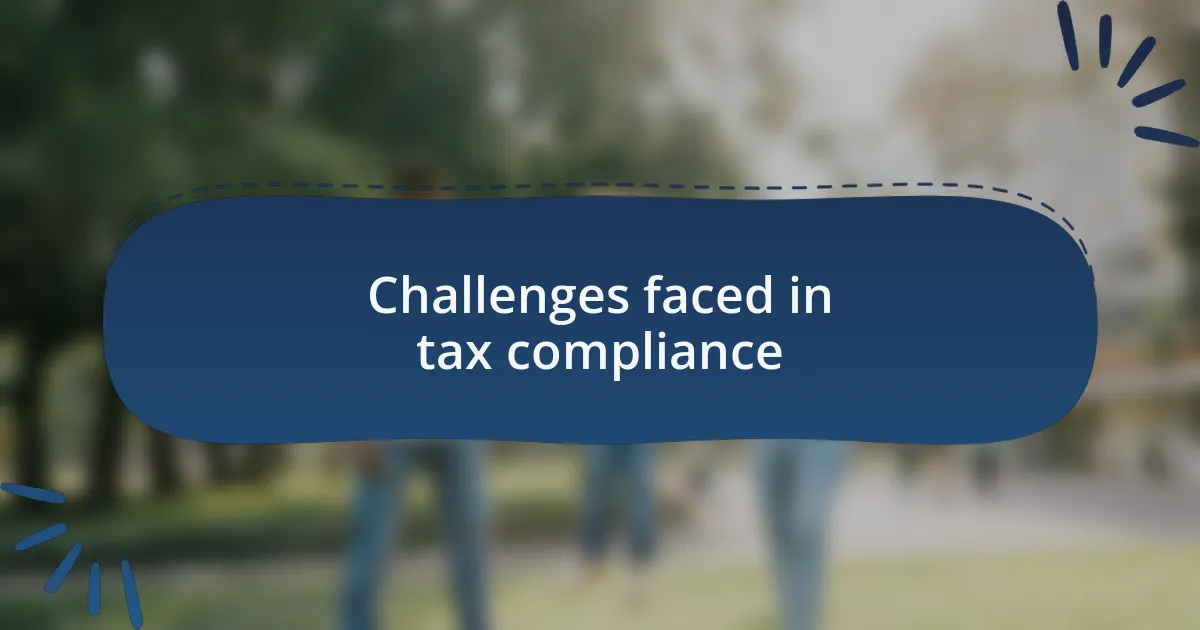
Challenges faced in tax compliance
Navigating tax compliance has often felt like walking a tightrope. The experience of gathering all necessary documentation can feel overwhelming at times. I remember poring over piles of receipts, realizing that even the smallest oversight could lead to complications—did I miss that one invoice for training materials? The pressure can be intense, especially when you know how much is riding on accurate reporting.
Another challenge I’ve encountered is the ever-shifting tax regulations. One year, for example, a new tax law came into effect that impacted our funding sources significantly. Keeping up with these changes demands not just diligence but an ongoing commitment to learning. It raises the question: how does one stay informed while managing the daily demands of child safeguarding work? The answer often lies in seeking trusted advice and forming partnerships with knowledgeable professionals—resources I learned to cherish over time.
I also found myself grappling with the emotional weight of these obligations. It can be discouraging to invest so much effort into compliance without an immediate payoff. I recall the anxiety before a deadline, questioning if I had done everything right. But through those moments of doubt, I learned resilience. Each compliance challenge became an opportunity not just for personal growth but for deeper commitment to my mission. Have you faced similar fears in your roles? I certainly have, and they continually remind me of why we do this work.
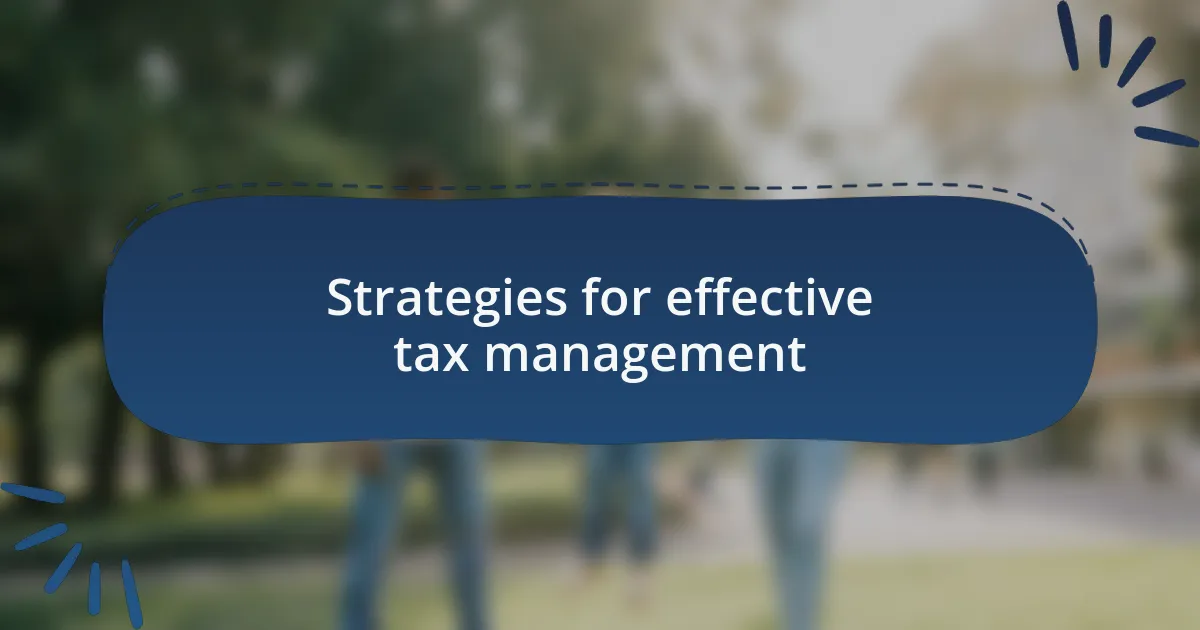
Strategies for effective tax management
Managing tax obligations effectively requires a proactive approach. One strategy I found invaluable was organizing my financial records throughout the year, rather than waiting until tax season. For instance, I developed a habit of categorizing expenses monthly, which eased the stress during tax preparation. How many of us have felt the weight of last-minute scrambling at the deadline? I certainly have, and it’s a panic I prefer to avoid.
Another essential strategy is leveraging technology to simplify the process. I discovered software that not only tracked expenses but also generated reports with a few clicks. This not only saved me time but also minimized the chances of errors creeping in. Have you thought about how technology can transform your approach to tax management? Embracing these tools can feel like a game-changer, providing peace of mind while ensuring accuracy.
Lastly, I learned the importance of ongoing education. Regularly attending workshops or webinars helped me grasp the nuances of tax laws and grant requirements. It’s a continuous learning curve, but I found that investing time in understanding these complexities paid off in clarity and confidence. How often do we prioritize our growth in financial literacy? For me, it became a crucial element in transforming tax obligations from an overwhelming hurdle to a manageable aspect of my work.
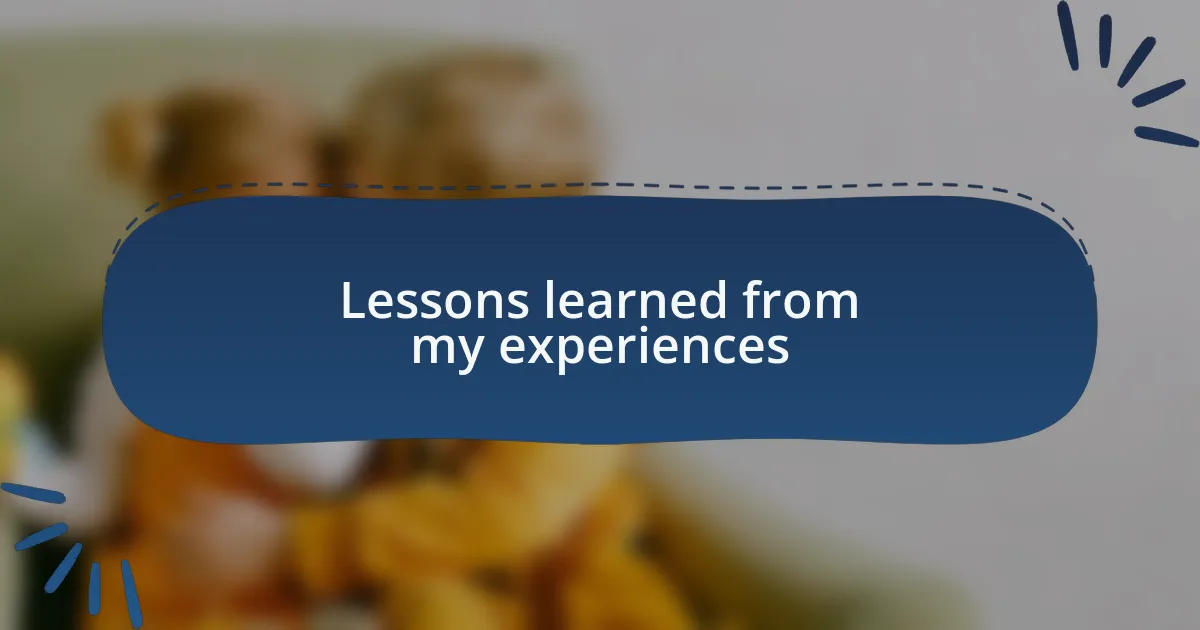
Lessons learned from my experiences
One of the most significant lessons I learned is the value of early preparation. I remember a year when I delayed my tax preparation until the last minute, thinking I could tackle it all at once. The stress was unbearable, a frantic race against time that left me feeling overwhelmed. From that experience, I realized that a little effort early on makes a world of difference. Why push yourself to the brink when a bit of organization throughout the year could alleviate that pressure?
Another crucial lesson was understanding the importance of seeking professional advice. I once navigated a complicated tax issue solo, convinced I had it all figured out. But after consultations with a tax advisor, my perspective shifted. I not only saved money but also gained insights into deductions I had overlooked. Have you ever felt hesitant to ask for help? I learned that embracing expert guidance can turn a daunting process into a more straightforward and stress-free journey.
Finally, I came to appreciate the emotional aspect of managing tax obligations. Initially, I viewed taxes as nothing but a burden, a looming deadline that filled me with dread. However, by reframing my mindset to see taxes as a part of supporting my community, I began to feel a sense of purpose behind the process. How often do we consider the broader impact of our financial contributions? This shift in thinking not only reduced my anxiety but also fueled my dedication to staying informed and compliant.